Solar Installers West Boylston
Find Solar Companies in West Boylston
Receive 3 FREE Solar Company quotes for your project today! Compare profiles, reviews, accreditations, portfolio, etc... and choose the best offer.

PI Berlin North America
Solar Street, Building 5, Berlin, 10115, USWelcome to the Kiwa global website. We are a leading technical advisor, risk manager, and quality assurance provider for photovoltaic power plants and equipment. Our vision is to be a leading technical advisor in the race to global energy sustainability.
- Services
- Why Us?
- Accreditations
- Our Team
- Testimonials
- Gallery
Get Quote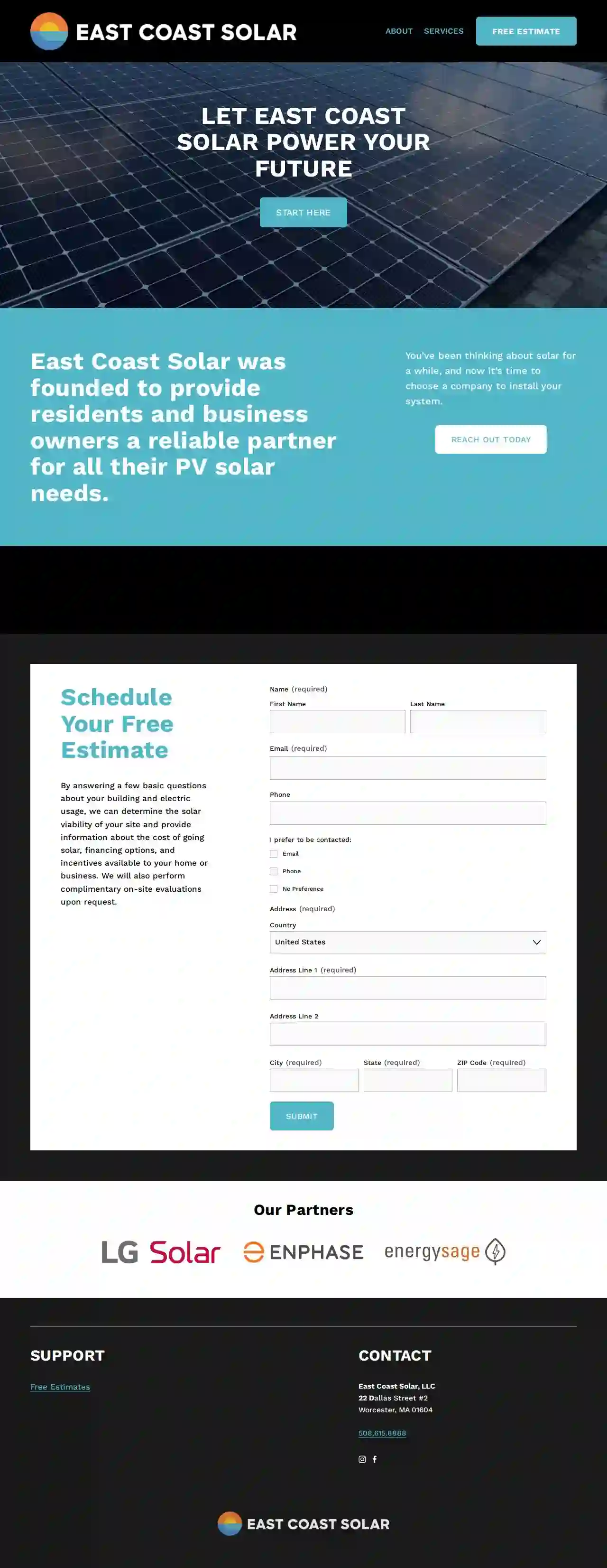
East Coast Solar, LLC
58 reviews22 Dallas Street, #2, 22 Dallas Street #2, Worcester, 01604, USEast Coast Solar, LLC is a reliable partner for all your PV solar needs. Founded to provide residents and business owners with a reliable partner for all their PV solar needs. They offer a variety of services including Rooftop Solar, Solar Storage, Service & Repair, Ground Mount, EV Chargers, Critter Guards & Snow Guards.
- Services
- Why Us?
- Accreditations
- Our Team
- Testimonials
- Gallery
Get Quote
Whaling City Solar
4.712 reviewsNew Bedford, MA, 123 Solar Street, 02740, USWhaling City Solar was founded in 2020 to create a better customer experience in purchasing solar equipment. We see a lot of door knocking, cold calling and social media ads companies showing one picture of solar, while in reality solar systems can take dozens of forms. We founded our company to tailor fit each and every array to its home and owners.
- Services
- Why Us?
- Accreditations
- Our Team
- Testimonials
- Gallery
Get Quote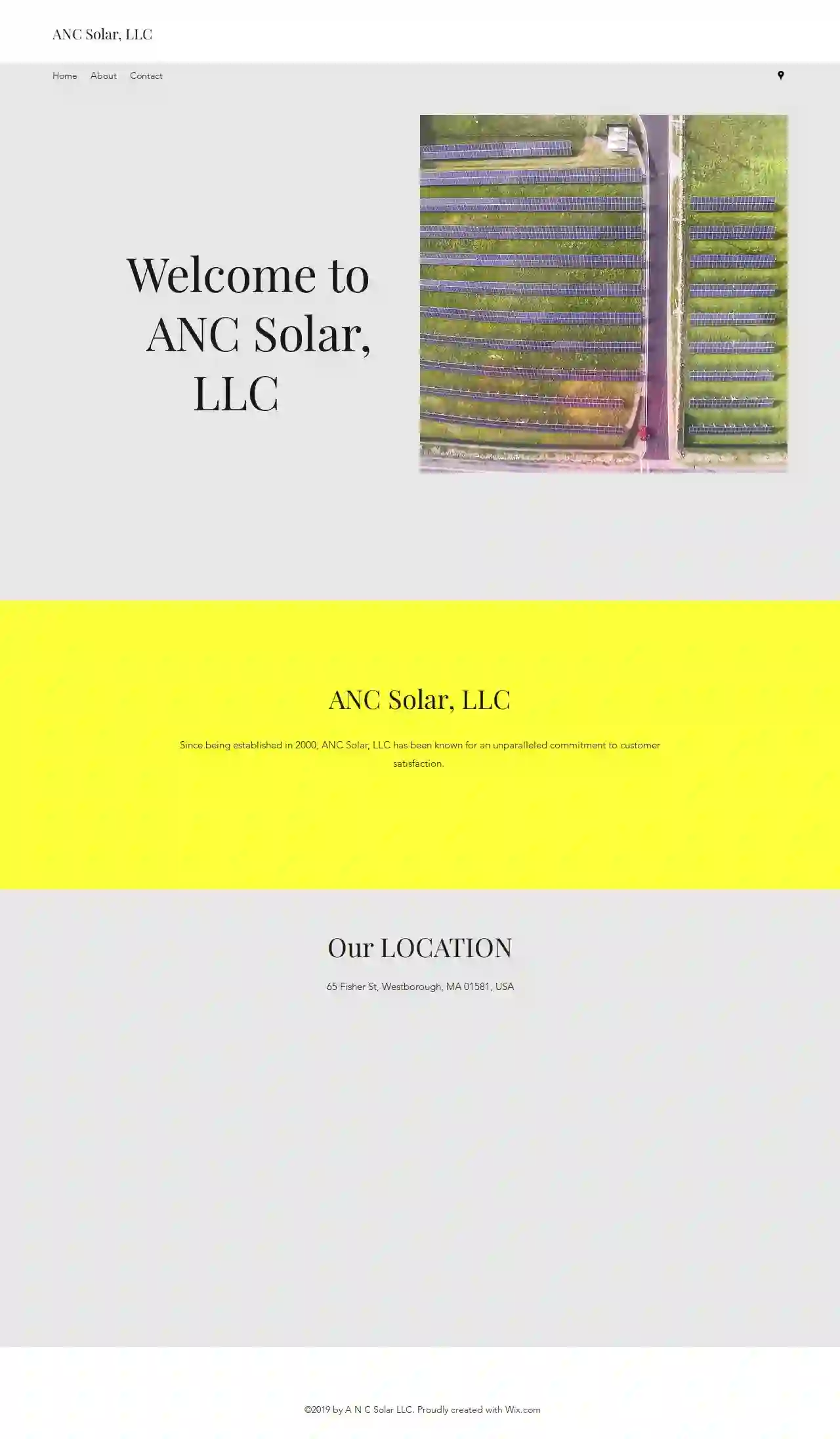
A N C Solar LLC
Westborough, MA, 65 Fisher St, 01581, USANC Solar, LLC has been known for an unparalleled commitment to customer satisfaction since being established in 2000. The company is located at 65 Fisher St, Westborough, MA 01581, USA.
- Services
- Why Us?
- Accreditations
- Our Team
- Testimonials
- Gallery
Get Quote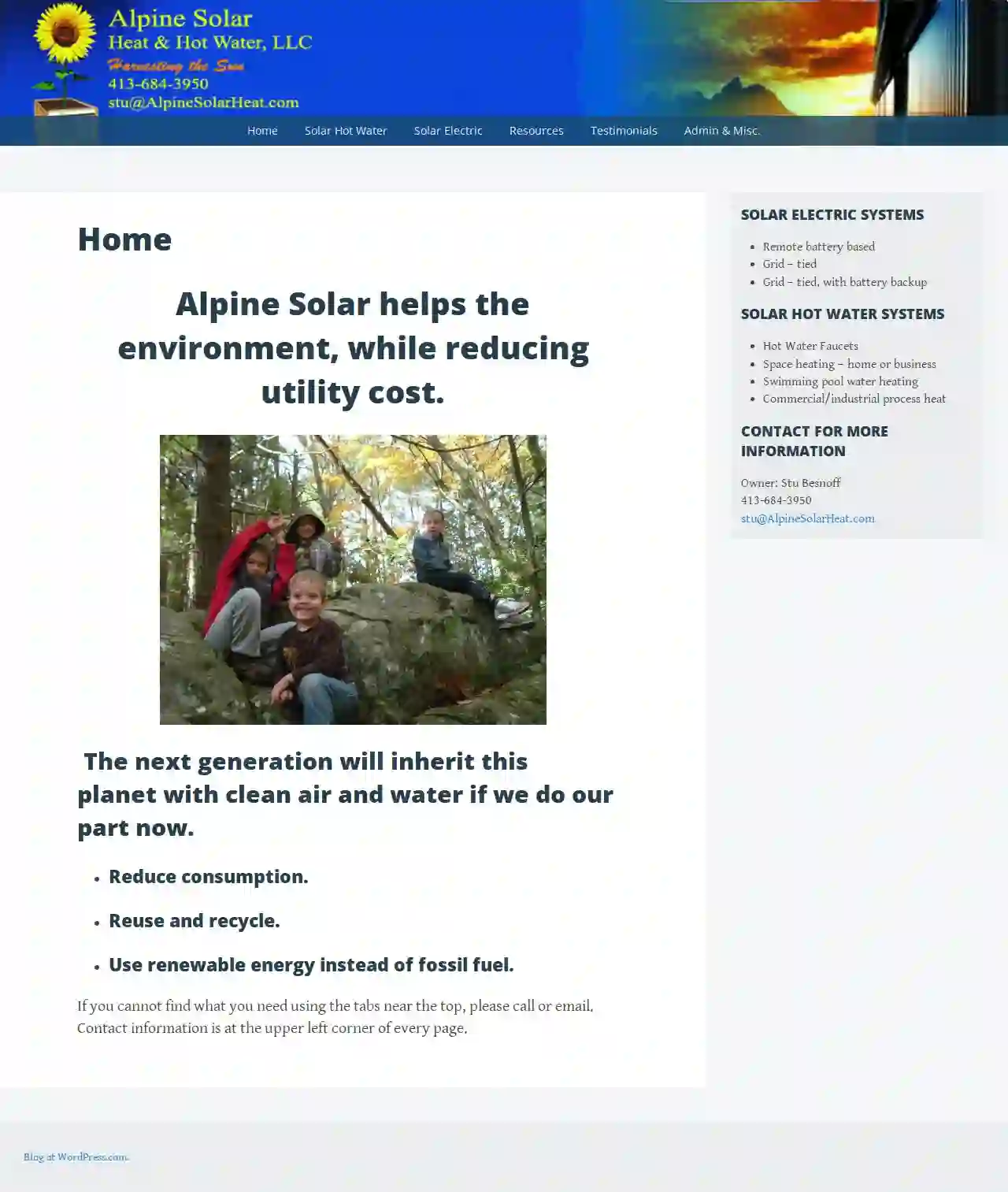
Alpine Solar Heat and Hot Water, LLC
51 reviews123 Main St, Springfield, MA, 01001, USAlpine Solar helps the environment, while reducing utility cost. The next generation will inherit this planet with clean air and water if we do our part now. Reduce consumption. Reuse and recycle. Use renewable energy instead of fossil fuel. If you cannot find what you need using the tabs near the top, please call or email. Contact information is at the upper left corner of every page.
- Services
- Why Us?
- Accreditations
- Our Team
- Testimonials
- Gallery
Get Quote
Ameresco, Inc.
36 reviews111 Speen Street, Suite 410, Framingham, MA USA, 01701, USAmeresco is a leading cleantech integrator and renewable energy asset developer, owner, and operator. Founded in 2000, the company has a comprehensive portfolio including energy efficiency, infrastructure upgrades, asset sustainability, and renewable energy solutions delivered to clients throughout North America and Europe. Leveraging budget-neutral solutions, Ameresco eliminates financial barriers that traditionally hamper energy efficiency and renewable energy projects.
- Services
- Why Us?
- Accreditations
- Our Team
- Testimonials
- Gallery
Get Quote
Boston Solar
4.712 Gill St. Suite - 5650, Woburn, MA 01801, 01801, USBoston Solar is a leading provider of solar energy solutions for residential and commercial properties in Massachusetts. With a focus on sustainability and energy efficiency, they offer a range of services including solar panel installation, solar financing options, and solar energy resources. Their team of experts is dedicated to providing top-quality service and ensuring customer satisfaction.
- Services
- Why Us?
- Accreditations
- Our Team
- Testimonials
- Gallery
Get Quote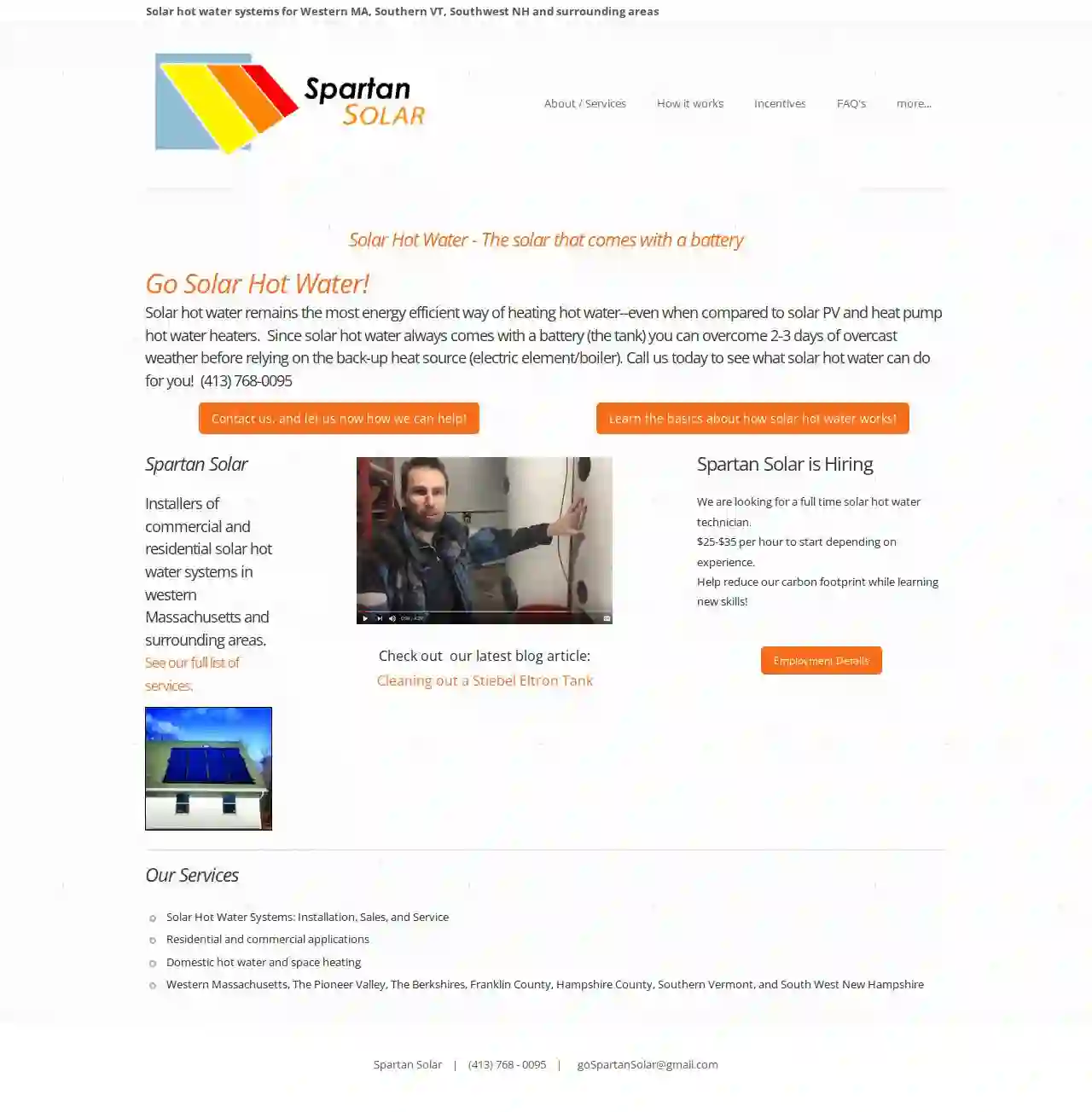
Spartan Solar
52 reviews10 Charles St., Greenfield, 01301, USSpartan Solar is a company that specializes in the installation, sales, and service of solar hot water systems for residential and commercial applications in Western Massachusetts, The Pioneer Valley, The Berkshires, Franklin County, Hampshire County, Southern Vermont, and South West New Hampshire. They offer domestic hot water and space heating solutions and are committed to reducing carbon footprint.
- Services
- Why Us?
- Accreditations
- Our Team
- Testimonials
- Gallery
Get Quote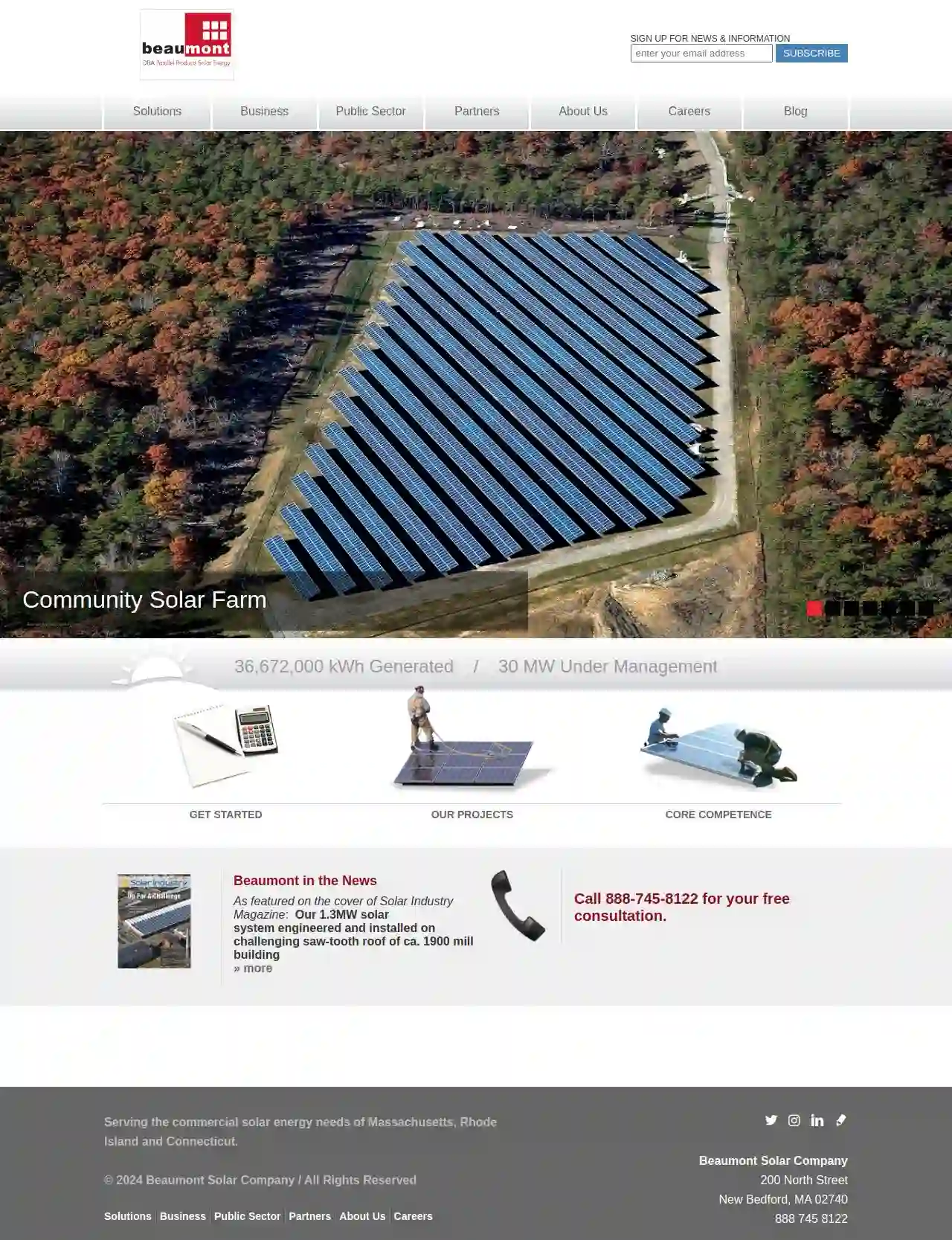
Beaumont Solar Company
12 reviewsNew Bedford, MA, USA, 200 North Street, 02740, USBeaumont Solar Company is a leading provider of commercial solar energy solutions in Massachusetts, Rhode Island, and Connecticut. With a focus on vertical integration, the company offers the lowest cost solutions, on-time and on-budget projects, and best-in-class technology and construction. Beaumont Solar has generated over 36,672,000 kWh and manages over 30 MW of solar projects. The company is committed to community involvement and has been featured in various news outlets for its innovative projects and industry leadership.
- Services
- Why Us?
- Accreditations
- Our Team
- Testimonials
- Gallery
Get Quote
SunRa Solar, Inc.
53 reviews17 Jan Sebastian Dr Suite 13, Suite 13, Sandwich, 02563, USSunRa Solar, Inc. is a local business that specializes in providing affordable quality solar energy solutions. They offer a range of services including solar system installation, solar energy benefits, financing options, and solar incentives. Their mission is to provide clean, renewable energy to homes and businesses in Massachusetts.
- Services
- Why Us?
- Accreditations
- Our Team
- Testimonials
- Gallery
Get Quote
Over 4,210+ Solar Companies onboarded
Our solar pros operate in West Boylston & beyond!
SolarCompaniesHub has curated and vetted the Best Solar Companies arround West Boylston. Find the most reliable contractor today.
Frequently Asked Questions About Solar Installers
- Solar Panel Warranty: From the panel manufacturer, typically covering defects in materials and workmanship for 10-25 years. Some manufacturers offer performance guarantees, ensuring a certain level of energy output over time.
- Solar Installation Warranty: From the solar installer, covering the quality of the installation work for 1-10 years. This warranty protects you from leaks, faulty wiring, or other issues caused by improper installation.
- Your current energy usage
- The size of your solar system
- Your local electricity rates
- The amount of sunlight your panels receive
- Available net metering policies
- Monocrystalline: Made from a single silicon crystal, known for high efficiency (typically 18-22%) and sleek black appearance.
- Polycrystalline: Made from multiple silicon crystals, slightly less efficient (15-17%) but often more affordable than monocrystalline.
- Thin-film: Made from thin layers of photovoltaic material, lower efficiency (8-12%) but can be flexible and lightweight.
What kind of warranty should I expect for my solar panel system?
How much can I save on my electricity bill with solar panels?
What are the different types of solar panels?
How do solar panels work?
What kind of warranty should I expect for my solar panel system?
- Solar Panel Warranty: From the panel manufacturer, typically covering defects in materials and workmanship for 10-25 years. Some manufacturers offer performance guarantees, ensuring a certain level of energy output over time.
- Solar Installation Warranty: From the solar installer, covering the quality of the installation work for 1-10 years. This warranty protects you from leaks, faulty wiring, or other issues caused by improper installation.
How much can I save on my electricity bill with solar panels?
- Your current energy usage
- The size of your solar system
- Your local electricity rates
- The amount of sunlight your panels receive
- Available net metering policies
What are the different types of solar panels?
- Monocrystalline: Made from a single silicon crystal, known for high efficiency (typically 18-22%) and sleek black appearance.
- Polycrystalline: Made from multiple silicon crystals, slightly less efficient (15-17%) but often more affordable than monocrystalline.
- Thin-film: Made from thin layers of photovoltaic material, lower efficiency (8-12%) but can be flexible and lightweight.